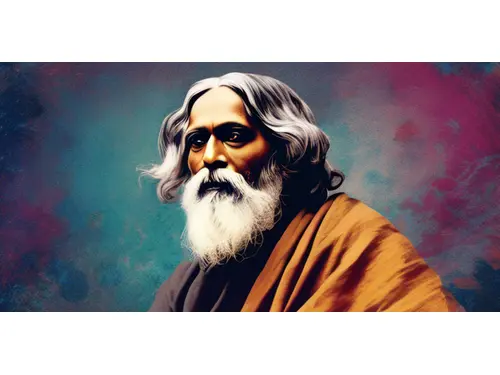
Why Rabindranath Tagore Matters Today?
By Meenakshi G on January 21, 2025
Rabindranath Tagore, a polymath of unparalleled brilliance, left an indelible mark on literature, art, and philosophy. Best known as the first non-European to win the Nobel Prize in Literature in 1913, his works transcend boundaries and continue to inspire millions. Let’s explore the profound legacy of this remarkable figure and how his words and worldview shaped history and culture.
Who Was Rabindranath Tagore?
Rabindranath Tagore (1861–1941) was a poet, writer, composer, and philosopher from Bengal, India. Born into an affluent family in Calcutta, his upbringing was steeped in literature, music, and art. From a young age, he displayed a natural talent for storytelling and poetry.
Tagore’s works span across diverse genres—poetry, plays, short stories, essays, and even paintings. His seminal work Gitanjali, a collection of poems, earned him global acclaim and the Nobel Prize.
The Essence of Tagore’s Philosophy
Tagore’s philosophy is deeply rooted in humanism, universalism, and the quest for spiritual freedom. He believed in the unity of humanity and nature, often challenging rigid social norms and hierarchies.
- Humanism: His writings reflect a deep faith in the potential of the human spirit. Works like The Home and the World delve into human struggles and moral dilemmas.
- Universalism: Tagore’s emphasis on global harmony made him a cultural ambassador, connecting the East and the West.
- Nature and Spirituality: Tagore found inspiration in the natural world, a theme omnipresent in his poetry and songs, such as “Amar Shonar Bangla” and “Where the Mind is Without Fear.”
Tagore as a Literary Genius
Poetry
Tagore’s poetic brilliance lies in his ability to weave intricate emotions with universal truths. His poems are accessible yet profound, addressing themes of love, divinity, and existential reflection.
Short Stories
Tagore is considered one of the pioneers of the modern short story in India. Tales like Kabuliwala and The Postmaster explore the complexities of human relationships with simplicity and depth.
Songs and Music
A gifted composer, Tagore created over 2,000 songs known as Rabindra Sangeet. His music combines classical Indian elements with lyrical poetry, often reflecting a deep sense of patriotism and introspection.
Tagore’s Impact on Education
Tagore believed education should be holistic, nurturing creativity and critical thinking. He founded Visva-Bharati University in Santiniketan, emphasizing an open and inclusive learning environment. The institution remains a beacon of innovative education to this day.
Art and Culture: A New Dimension
Tagore took up painting later in life, and his art exhibits a blend of abstraction and emotional depth. His visual works, much like his writings, are deeply personal yet universally resonant.
The Enduring Legacy
- Global Influence: Tagore’s work continues to inspire writers, thinkers, and leaders worldwide. His translations of Gitanjali introduced Indian literature to global audiences.
- Social Reforms: Tagore used his platform to speak against social injustices, such as caste discrimination and gender inequality.
- Cultural Unity: His vision of a united world, free from narrow identities, remains relevant in today’s divisive times.
Why Rabindranath Tagore Matters Today
In an era of rapid technological change and cultural fragmentation, Tagore’s message of harmony and universalism is a beacon of hope. His works remind us of the beauty of human connection and the transformative power of creativity.
Tagore once said, “The highest education is that which does not merely give us information but makes our life in harmony with all existence.” This timeless wisdom encapsulates his enduring influence.